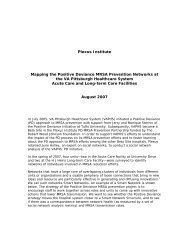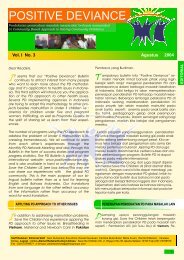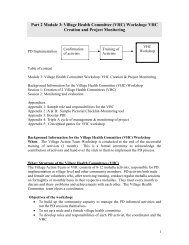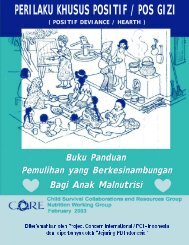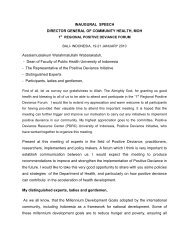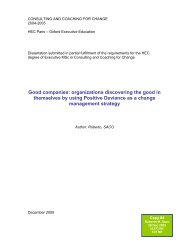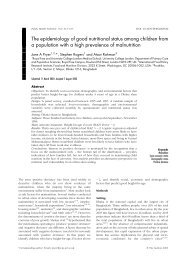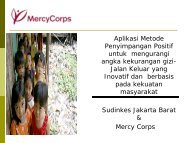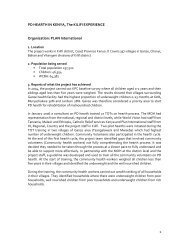F&N Bulletin Vol 23 No 1b - United Nations University
F&N Bulletin Vol 23 No 1b - United Nations University
F&N Bulletin Vol 23 No 1b - United Nations University
Create successful ePaper yourself
Turn your PDF publications into a flip-book with our unique Google optimized e-Paper software.
68<br />
J. Ghanekar et al.<br />
Procurement-related behavior of pregnant women<br />
The EDM given in fig. 1 summarizes the pathway<br />
taken by the women to procure iron–folic acid supplements<br />
from various sources. When a woman confirms<br />
her pregnancy, she tells a family member, either her<br />
husband or her mother-in-law. Sometimes the family<br />
members take her to a government or private hospital<br />
or an Anganwadi center, or they do not show any interest;<br />
however, the latter happens rarely. At the government<br />
hospital and at the Anganwadi, iron supplements<br />
in the form of iron–folic acid tablets are provided<br />
free of cost to the woman. At a private hospital, the<br />
doctor who examines her usually writes a prescription<br />
for iron supplements, which the woman may or may<br />
not purchase from the local pharmacy. The pregnant<br />
women who go to the Anganwadi for supplementary<br />
food may also receive iron–folic acid tablets, or they<br />
can get the tablets when the Anganwadi worker makes<br />
a home visit. The women may also receive iron–folic<br />
acid tablets from the Vadodara Municipal Corporation<br />
auxiliary nurse midwives or multipurpose female<br />
workers when they visit the slum areas or at the maternal<br />
and child health clinics conducted by the corporation<br />
health posts every week.<br />
Although all the women in this study had access<br />
to free iron–folic acid supplements, some women<br />
received them from government health facilities or<br />
purchased them from pharmacies as prescribed by<br />
their private medical practitioners. Some women<br />
received the supplements from multiple sources, such<br />
as ICDS Anganwadis or government hospitals, and<br />
they also purchased them from pharmacies, thus often<br />
receiving many more tablets than the minimum dose<br />
of 100.<br />
However, although the iron–folic acid supplements<br />
were available to the women from multiple sources<br />
that were easily accessible in the study areas, this might<br />
not be the case in certain slums located away from<br />
government hospitals and private clinics.<br />
Compliance-related behavior<br />
The in-depth interview data revealed certain household-level<br />
factors influencing the consumption of the<br />
supplements by the women, which are depicted in the<br />
Woman confirms<br />
pregnancy<br />
Tells FM<br />
Visits doctor<br />
Visits AWW<br />
ANM (home visit)<br />
FM does not<br />
show interest<br />
Government<br />
hospital<br />
Private<br />
hospital<br />
AWW gives IFA<br />
to PW<br />
ANM gives IFA<br />
to PW<br />
AWW makes<br />
a home visit<br />
AWW does not<br />
make a home visit<br />
Doctor advises PW<br />
to take IFA<br />
supplements<br />
Doctor advises PW<br />
to take IFA<br />
supplements<br />
Gives IFA<br />
supplements<br />
PW does not get<br />
IFA supplements<br />
Gives IFA<br />
supplements<br />
free of cost<br />
Gives a prescription<br />
Buys IFA from<br />
pharmacy<br />
May also go to AW<br />
for food supplements<br />
AWW also gives<br />
IFA supplements<br />
Does not buy IFA<br />
FM:<br />
IFA:<br />
PW:<br />
AW:<br />
AWW:<br />
ANM:<br />
Family member(s)<br />
Iron–folic acid supplements<br />
Pregnant woman<br />
ICDS Anganwadi<br />
Anganwadi worker<br />
Auxiliary nurse midwife<br />
Frequent response (>50% of subjects)<br />
Infrequent response (




